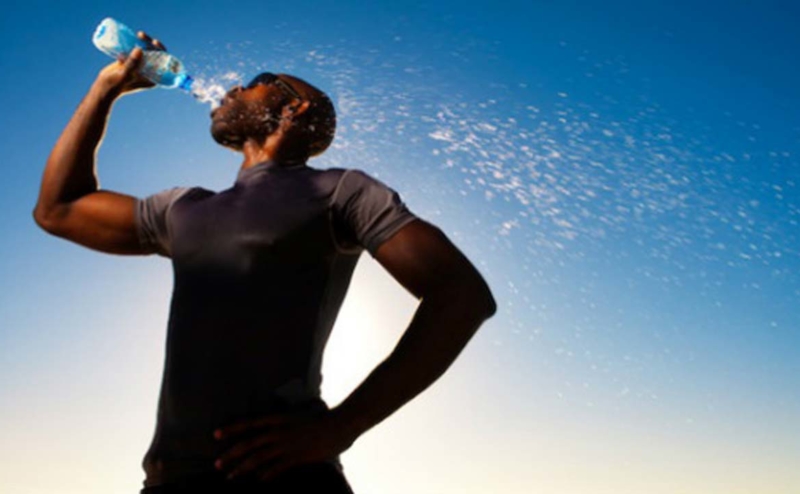It has been unbelievably hot the last couple of weeks. At this time of the year, temperatures peak, there is undeniable heat, profuse sweating and quick dehydration of the body; all these call for individuals to ensure to take deliberate actions to remain hydrated.
It doesn’t take much to get you dehydrated. Losing just about 1.5 per cent of your body water content, moves you to the tipping point of mild dehydration. Being dehydrated can make one tired, grumpy, prone to weight gain, and this begins the moment lost body fluids (majorly water) exceed fluid intake. We lose water every day in different forms: water vapor in the breath we exhale, sweat, urine, stool; small amounts of salts and electrolytes are also lost in the process.
Why Dehydration is an enemy
Dehydration brings on health effects ranging from fatigue and bad breath to various other dangerous consequences like distracted driving and acute loss of body electrolytes and possibly death. I will address a couple below:
• Fatigue, headache and dizziness
When one’s dehydrated, the blood pressure drops, heart rate increases and blood flow to the brain slows down, all of which can cause tiredness and dizziness. Lack of water affects the body’s serotonin levels, which can cause headaches. Also, small blood vessels in the brain respond quickly to hydration levels which may cause dull aches or even full-blown migraines. Taking a glass or two of water will help ease headaches when next experienced.
• Hunger and sugar cravings
Sometimes, dehydration can mask itself as hunger or particularly sugar cravings. This often happens when one has been working out or exercising in a dehydrated state. Glycogen (stored carbohydrate) is used up at a faster rate, thus diminishing the amount stored up by the body faster. This is the reason why you may likely crave carbs after exercising, in order to help you replenish your glycogen levels. It is advisable to sip on water at intervals when exercising.
• Workout wreck
Being mildly dehydrated affects your ability to put in effort during your workout. The more dehydrated you become, the worse performance gets during workout session. The muscles get worn out because of lack of water supply, which makes physical tasks feel more difficult and tiring.
• Constipation
The human body needs water to keep things moving through the digestive and excretory system. When fluid intake is inadequate, your body compensates by withdrawing more fluid from stool, making it harder and more difficult to pass out. However other factors such as medications, underlying health conditions or lack of fibre in your diet may also cause constipation.
• Bad breath
You may find people standing unusually far from you when you open your mouth to speak. This may be because you have forgotten to drink water during a busy day. Saliva has important antibacterial properties, so when dehydrated, the decreased saliva in the mouth allows for growth of bacteria, resulting in bad breath. So, it’s important to drink up for your own sake, and for the sake of those around you as well.
• Mood swings and irritability
Neurological effects of dehydration may cause irritability and crankiness. Take a deep breath and drink a glass of water and your mood may change.
• Chills
This may seem counterintuitive, but dehydration can bring about chills as a result of your body limiting blood flow to the skin which in the real sense helps to keep the body warm just like the body fat. Water also holds heat. So when dehydrated, it can be more difficult to regulate the body temperature which can cause chills faster even when your environment is not cold.
• Pale and dry skin
Drinking enough water rejuvenates and keeps the skin glowing. Therefore, for smooth, moisturized and healthy skin, ensure that your body is properly hydrated. It’s also advisable to shower only with lukewarm water as hot water can dry your skin.
Foods that can help you keep hydrated
• Cucumber: Perfect in salads. Can be sliced up and munched fresh or can be made into chilled cucumber soup.
• Iceberg lettuce: Good in sandwiches. Good as a bed for a healthy chicken salad or useful as a wrap.
• Tomatoes: Sliced or diced tomatoes will always be a mainstay of salads, sauces, soups and sandwiches.
• Green peppers (bell peppers): They can be sliced and munched fresh or used as part of the veggies in rice or used in making sauces
• Cauliflower or Broccoli: Can be broken up and added to your salad for a satisfying crunch.
• Watermelon: Can be snacked on, juiced or used in fruit salads.
• Spinach: Can be eaten fresh by putting in your sandwich or salad
• Strawberries: Can also be snacked on, made into smoothies or mixed in a no-fat yogurt.
There may be a surprising link between dehydration and weight gain in that sometimes, dehydration may mask and present itself as hunger, causing people to satiate “the hunger” with food/junk when in actual sense they are thirsty. Therefore, intake of adequate amounts of water may be one of the ways to go in maintaining a healthy weight. Diet which includes more water, whether as a beverage or water found in fruits and vegetables, should be tried out more often.
Guardian
This page has been viewed 607 times
Tags : Editors choice






























